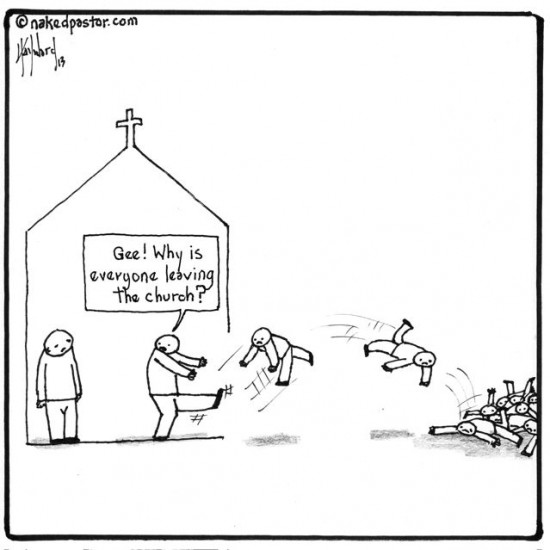
Rachel Held Evans writes for CNN’s religion blog on “Why Millennials Are Leaving the Church”. I like what she has to say and am in agreement with much of it. This one sentence summarizes her opinion well:
“…the assumption among Christian leaders, and evangelical leaders in particular, is that the key to drawing twenty-somethings back to church is simply to make a few style updates…”
She continues later:
“What millennials really want from the church is not a change in style but a change in substance.”
The “substance” Held Evans is speaking of is: an end to culture wars; a truce between science and faith; positive rather than antagonistic values; the right to ask questions; kingdom of God over party politics and nationalism; LGBT rights; and holiness in matters of sex as well as social justice. In a nutshell, she concludes:
“…we’re leaving the church because we don’t find Jesus there… Like every generation before ours and every generation after, deep down, we long for Jesus.”
I hear where she’s coming from. I agree that the church is fascinated with tweaking but not transforming itself. I agree there needs to be substantial change. I think maybe some millennials might want change in substance. But not all. So I would like to push Rachel Held Evans’ argument a little further and suggest that most millennials just don’t care what the church does. It is actually dead to them already.
You can change the style. You might keep some. You can change the substance. You might keep more. The substantial change people are talking about, in my opinion, is not substantial enough. Again, the substantial changes suggested are, in their own way, a more radical form of tweaking. I suspect a much deeper change is coming because the church is becoming not only less and less relevant, but less and less necessary. The suggested substantial changes can now be achieved without the aide or even presence of the church. This is the church’s problem that it doesn’t seem willing or able to admit. The church is gaping down the throat of its own death and can’t face it.
The millennials I know don’t even think about the church. It never crosses their minds. It doesn’t appear within the scope of their needs. As their fierce sense of spiritual independence grows, the need for external spiritual authorities, institutions and venues shrinks. I think that even using such words as “belief”, “faith”, “church”, “kingdom of God”, and “Jesus” betrays a desperate devotion to a passing paradigm.
The metaphor of death and resurrection applies here. Death, of course, means the end of everything. The story of Jesus’ death is not a mock up, staged, or, as some gnostic theologians taught, partial. It was total annihilation. Complete death. An utter and tragic end to all of it.
Of course, this then sets the stage for the powerful metaphor of resurrection… something totally new and, compared to the old, barely even recognizable. This is what we are resisting because of our attachment to what is and our premonitory grief for its passing.











